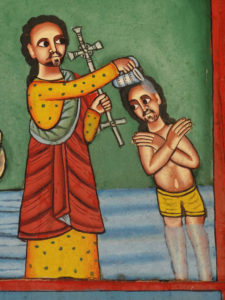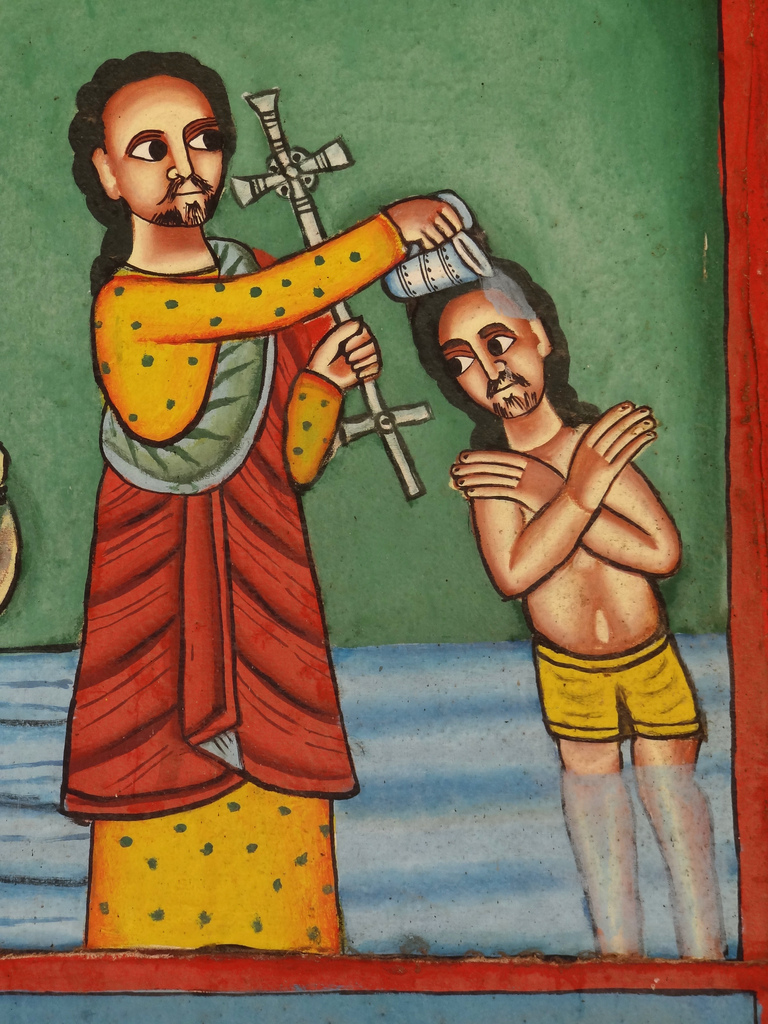
John the Baptist
Devotions on John 1:19-34
Monday–John the Baptist
“He confessed and did not deny it, but confessed, “’I am not the Messiah’” (John 1:20).
According to Reza Aslan, in his book Zealot (Random House, New York, 2013) there were scores of men traveling around Judea and Galilee claiming to be the Messiah. John could have joined them. He could have had an even greater following than he did. Many were claiming that John was the Messiah and John could have listened to them and begun to believe them, but he didn’t.
John knew who he was. More importantly, John knew who Jesus was—that Jesus was the true Messiah. Jesus was the one who ushered in the Kingdom of God.
Amid the mounds of wrapping paper, the piles of presents and tables loaded with food, we pause and listen to the Christmas story. “Unto us is born today, in the city of Bethlehem a Savior, who is Christ the Lord.” The child is not just a cute baby. He is God who dwells among us. He is the King of kings and the Lord of lords. As his followers, it is Jesus whom we serve and obey.
Lord, we give you thanks today for your gift of Jesus and for the hope, love, joy and peace that he freely offers to all humankind. Amen.
Tuesday–John the Baptist
“He said, ‘I am the voice of one crying out in the wilderness, Make straight the way of the Lord’” (John 1:23).
‘Tis the season for preparations. Arrangements were made for office parties and neighborhood get-togethers. Cookies and other goodies were baked to be enjoyed by family and friends. More preparations were made for the arrival of family to celebrate the birth of the Christ child with each other. We know what it means to prepare.
John the Baptist understood his ministry as one long time of preparation. The message he preached and the baptism by which he baptized announced the coming of the Messiah and enabled the people to be prepared for his arrival.
We continue the Baptist’s preparations. There’s more to do than bake endless batches of cookies or arrange for gatherings. We prepare the world and people around us with gracious words and acts of love. We serve as peacemakers, stand for justice with the outcasts and the ignored, and strive for all to experience the kingdom vision that everyone is a child of God. Even as we celebrate, the preparation continues.
Lord, use us as you did John the Baptist to prepare the world to experience your kingdom. Amen
Wednesday–John the Baptist
“I baptize with water” (John 1:26).
Baptism was a rather common practice at the time of John the Baptist and Jesus. Frequently converts were baptized to indicate that they were starting a new life. The Essene community practiced baptism on a daily basis in order to keep themselves ritually pure and able to participate in their life of service to the Lord.
Of course baptism is understood to be the entry point for the Christian church. Whether we understand our baptism to be an outward expression of our faith, or a celebration of God’s decision to make us children of God and fill us with the Holy Spirit, baptism is a part of our lives. As we walk as children of God and servants of the Lord, our baptism becomes a daily reality in our lives.
We are baptized. We are new creations and our words and actions reflect the new life that is ours.
Lord, thank you for making us new people through our baptism and for enabling us to live in a renewed relationship with you. Amen.
Thursday–John the Baptist
“The next day he saw Jesus coming toward him and declared, ‘Here is the Lamb of God who takes away the sin of the world’” (John 1:29).
These are perplexing words. When John identifies Jesus as “The Lamb of God,” he links Jesus to the sacrifice of the Passover lamb. The lamb, however, was never understood to be a sacrifice for the forgiveness of sins. Instead, the sacrifice was for deliverance. When the Israelites, who lived in Egypt, sacrificed the lamb and spread its blood on the doorframe of their homes, they were delivered from the angel of death.
Jesus says very little about sin and most Biblical scholars do not think Jesus ever linked his death on the cross to the forgiveness of sin. For many people, any god who would require the death of God’s son in order to forgive the sins of others is a repugnant god.
We may or may not agree with others on this aspect of Jesus’ death. However, we can agree that Jesus does deliver us from an old life of alienation and selfishness to one of reconciliation and service. Thought his life, death and resurrection, Jesus delivers us from death to life and no longer live in slavery, but in freedom.
Lord, thank you for delivering us to a new life with meaning and purpose and lived in a relationship with you. Amen.
Friday–John the Baptist
“I myself did not know him” (John 1:31).
Linda and Robert celebrated their fiftieth wedding anniversary. They had been engaged for two years before they were married. When they had exchanged vows, they had thought that they knew everything there was to know about the other person. How wrong they were. Over the years they have learned a lot more about each other and they expect that in the years ahead the learning will not stop.
In Luke’s gospel, John is a relative of Jesus. Some Biblical scholars think that Jesus was probably a disciple of John. In either case, John would have known Jesus, but he might not have known who Jesus was. The fact that Jesus was the Messiah was revealed to John. In the days, weeks and months that followed John learned more and more about Jesus.
Our relationship with Jesus is always a journey of discovery. We never stop learning about his love and grace, concern for those in need and opposition to those who selfishly use their wealth and their power. Whether we have walked as followers of Jesus for a short distance or for a long one, we have more to learn—wonder what we will learn today?
Lord, thank you that you continue to reveal yourself to us. May such knowledge change our hearts and minds and transform our lives. Amen.
Saturday–John the Baptist
“’I saw the Spirit descending from heaven like a dove, and it remained on him’” (John 1:32).
Several gospels never made it into the New Testament. Some of them include fanciful stories of Jesus as a young boy discovering his power. One story has him lengthening a wood plank because it had been cut too short. Another tells about a time when Jesus turned a handful of stones into living birds. As entertaining as these stories are, they counter a central tenet of the four gospels of the New Testament. The four gospels agree that Jesus performed no miracles until the Spirit descended upon him and he began his ministry.
It was God’s Spirit moving through Jesus that cast out demons and healed the sick. Through Jesus, the Spirit stilled the storm and fed the five thousand. It was God’s Spirit who enabled the paralytic to walk and raised Jesus from the dead.
This same Spirit has descended upon us and works through us. It is the Spirit who uses our words and actions to convey God’s love and grace to others. The Spirit is the one who gives people the ability to believe and to experience a new life—a free and abundant life. It is both humbling and exciting to know that the Spirit dwells within us.
Holy Spirit move within us so that we are clear channels of your love, grace and power. Amen.
Sunday–John the Baptist
“’And I myself have seen and have testified that this is the Son of God’” (John 1:34).
John the Baptist was a very religious, spiritual man, but he was not a great theologian. He didn’t sit quietly contemplating the relationship between the members of the Trinity or fine tune his understanding of the difference between predestination and foreknowledge. John realized that the role of theologian was not his calling. The Lord called John to be a witness.
In this first chapter of John, John the Baptist simply relates to the religious authorities and his disciples what he had seen and heard. The Lord had told him to look for the Holy Spirit descending upon a man and remaining. That man was Jesus and he was the Messiah.
Though our theological knowledge may increase and be sharpened as we walk with God, the Lord, though, calls us, like God did John the Baptist, to be witnesses. We witness to what we have seen and heard God do in our lives and in the lives of others. We tell about where we have experienced God’s love and grace, and we invite people to “come and see.” They can then become witnesses, too.
Lord, empower us to be both bold and loving in our witness to your love and grace. Amen.

